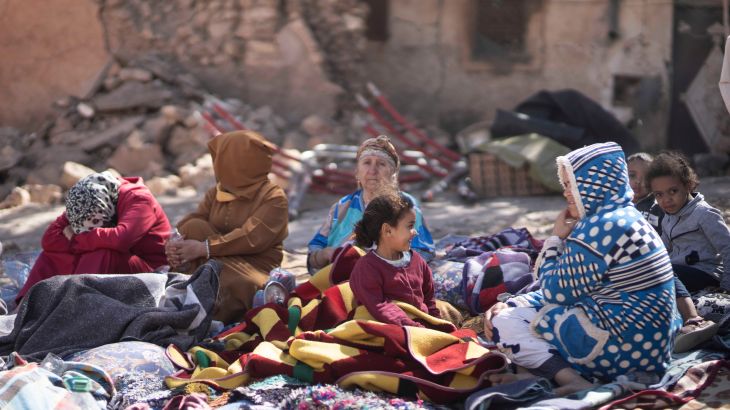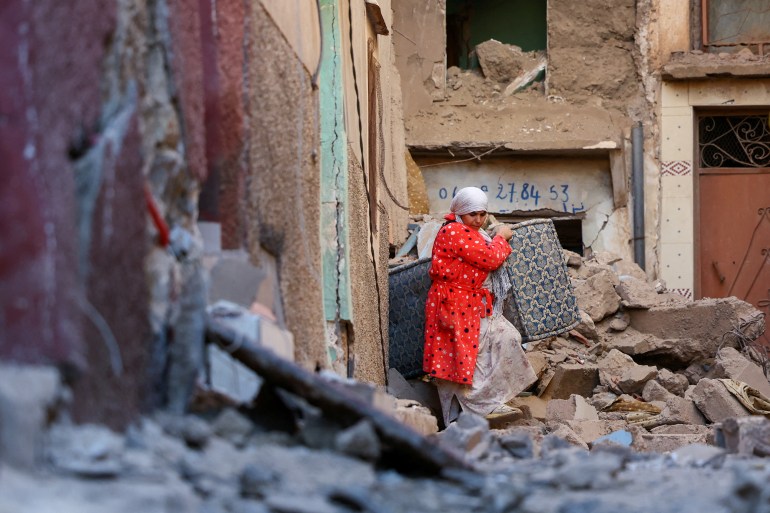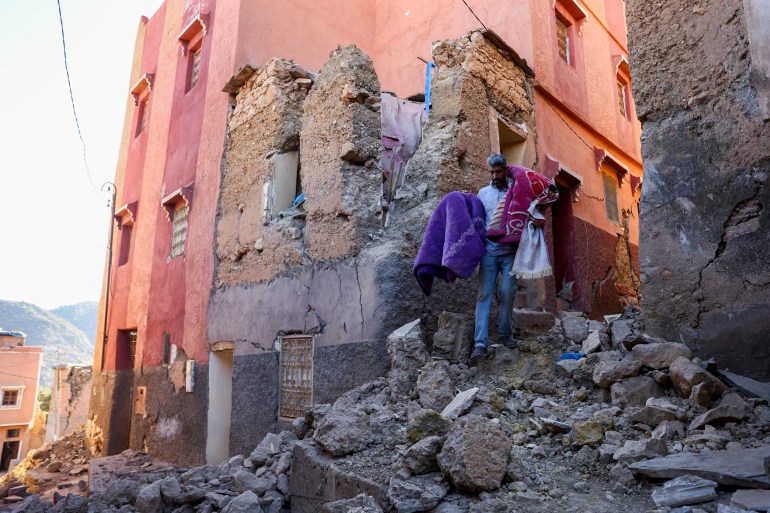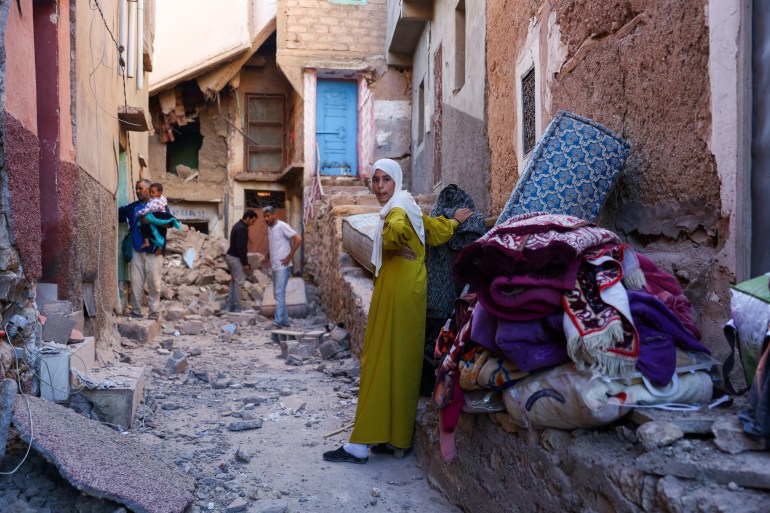Morocco residents speak of shock, horror as the earthquake struck
Moroccans in quake-devastated areas rally for one another as they remain stranded outdoors for the second day, pleading for help.

Saida Bodchich was asleep in her house in the Moroccan city of Marrakesh when the magnitude 6.8 earthquake struck.
Unable to escape quickly enough, she was trapped as the roof fell on Friday night. Luckily for her, the neighbours came to her rescue and pulled her out.
Keep reading
list of 4 itemsRace to find survivors as Morocco earthquake toll passes 2,000
Where in Morocco did the 6.8 magnitude earthquake strike?
‘Fragile state’: Fears for Marrakesh’s ancient structures after earthquake
“I was saved by my neighbours who cleared the rubble with their bare hands,” said Bodchich. “I am living with them in their house now because mine was completely destroyed.”
More than 2,012 people have been killed and at least 2,059 injured by the quake, also obliterating historic buildings in Marrakesh, the fourth largest city in Morocco about 70km (43 miles) from the quake’s epicentre.
Residents of many affected areas were rendered homeless by the destruction, while many opted to sleep in the open on Saturday night, fearing aftershocks or damaged roofs and walls crumbling.

Khadijah Satou, another Marrakesh resident, felt her room “spin” as she tried to figure out what was happening.
“I was just on the bed ready to sleep when things started to feel like a bit shaky,” she told Al Jazeera.
“At first I thought, maybe there’s a fire next door or construction. But the shaking was not something normal. I felt the room was spinning. It was traumatic. I’m speaking about it now but the feeling was really bad.
“I heard people screaming and then I realised that it’s an earthquake.”
Satou ran out of her apartment, without her shoes or phone. The staircase in her building was shaking as she left.
“At that moment, I was thinking there’s no way I could make out [of the building]. I think the earthquake was very short but it felt an eternity. People were crying, scared and everybody was hugging one other.”
The quake was recorded at a depth of 26km (16 miles), making it more destructive than deeper quakes of the same magnitude.
It was Morocco’s deadliest earthquake since 1960. Most of the deaths were reported in mountainous areas to the south in the Al-Haouz and Taroudant provinces.
Marrakesh’s famous Koutoubia Mosque, built in the 12th century, was damaged but the extent was not immediately clear. Videos posted online showed damage to parts of the famous red walls that surround the old city, a UNESCO World Heritage Site.

In the mountain village of Tafeghaghte near the quake’s epicentre, buildings erected from traditional clay bricks used by the region’s Berber inhabitants were destroyed.
In Amizmiz, 55km (34 miles) south of Marrakesh and lying at the foot of the High Atlas mountain range, rescue workers picked through rubble with their bare hands.
A resident told Al Jazeera all of its inhabitants have not only lost their homes but also each family is grieving the death of loved ones who died in the quake.
“We are living in a crisis situation,” another Amizmiz resident told Al Jazeera. “We ask that King Mohamed VI intervene and send us some help because we are living through a traumatic situation,” he said, adding the village lacks electricity, food and other necessary aid.

In Moulay Brahim, a village near the epicentre some 40km (25 miles) south of Marrakesh, residents described how they dug the dead from the rubble using their bare hands.
“We lost our houses and we lost people also and we are sleeping like two days outside,” said Yassin Noumghar, 36. “No food. No water. We lost also electricity. We want just for our government to help us.”
Back in Marrakesh, Satou says her aunt’s house in the old city was destroyed. One of her colleagues is still trying to get in touch with his family who live in the Atlas Mountains but has not been able to reach them yet.
While she is back at work – her employers have moved the office to a lower level – she says she cannot go back home.
“We slept in the garden last night fearing aftershocks. I’m traumatised. I cannot go back home. The feeling in the street is pretty bizarre. I’ve seen the city happy. I’ve seen the city sad. But this kind of sadness is unbelievable. People are in the streets because they’re scared to go to their houses.”